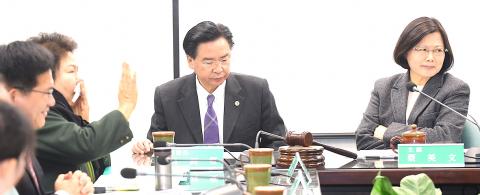The Democratic Progressive Party’s (DPP) Central Standing Committee yesterday unveiled its schedule for selecting nominees to represent the party in next year’s presidential and legislative elections, triggering divided reactions among party figures.
“[DPP] Chairperson Tsai Ing-wen (蔡英文) has briefed committee members during the meeting on the nomination schedule, and none had other opinions,” party spokesman Lin Chun-hsien (林俊憲) told a brief press conference after the committee meeting yesterday afternoon.
“Most members believed that the party performed well in [last year’s] nine-in-one elections because it planned ahead, and therefore agreed that the party should accelerate the nomination processes for president and legislators,” Lin said.

Photo: Liu Hsin-de, Taipei Times
According to the party’s schedule, the official announcement for the presidential primary election will be posted on Feb. 11. Registrations will be accepted from Feb. 12 to Feb. 16, and negotiations for the presidential nominees will end on Feb. 24. The primary campaign will be held from Feb. 26 to March 15, followed by an opinion poll from March 16 to March 18 to gauge the popularity of the presidential contenders, Lin said.
As for the legislative elections, the announcement for the primary will be posted on Feb. 26, the registration period will run from March 2 to March 6, and an opinion poll will be conducted from March 19 to April 10, Lin said.
“The lists of nominees for president and legislators will be made public on April 15,” he said.
Opinion on the nomination calendar appears to be divided.
“There is nothing bad about getting the nominations done earlier,” DPP Legislator Huang Wei-che (黃偉哲) said.
“Compared with 2012, the process has been moved earlier by a month this time; this way, we can get things settled earlier, and get ready for the election earlier,” Huang added.
DPP Legislator Tsai Huang-liang (蔡煌瑯) agreed, saying: “It is earlier this time, but not really that much earlier, so there should not be much of a difference.”
“What is more important is whether the nomination mechanism is fair,” Tsai said.
Former premier Frank Hsieh (謝長廷) disagreed, saying it might not be a good idea to start the nomination process at a time when legislative by-elections in five electoral districts are ongoing.
DPP Legislator Wu Ping-jui (吳秉叡), a close ally of former premier Su Tseng-chang (蘇貞昌), who is widely expected to be a presidential contender, agreed that starting the nomination process early might not be good for the ongoing legislative by-elections.
“I think we also need to be considerate about party employees and begin the nomination process after the Lunar New Year holiday so that they can enjoy the holiday,” Wu said.
Su also questioned whether “it is necessary to do it in such a hurry.”
On the other hand, Greater Tainan Mayor William Lai (賴清德) said that he “respects the decision by the Central Election Committee,” as “the party must have its own considerations.”
Amid speculation that he is also eyeing the presidency, Lai said he does not plan to register in the primary.

The brilliant blue waters, thick foliage and bucolic atmosphere on this seemingly idyllic archipelago deep in the Pacific Ocean belie the key role it now plays in a titanic geopolitical struggle. Palau is again on the front line as China, and the US and its allies prepare their forces in an intensifying contest for control over the Asia-Pacific region. The democratic nation of just 17,000 people hosts US-controlled airstrips and soon-to-be-completed radar installations that the US military describes as “critical” to monitoring vast swathes of water and airspace. It is also a key piece of the second island chain, a string of

A magnitude 5.9 earthquake that struck about 33km off the coast of Hualien City was the "main shock" in a series of quakes in the area, with aftershocks expected over the next three days, the Central Weather Administration (CWA) said yesterday. Prior to the magnitude 5.9 quake shaking most of Taiwan at 6:53pm yesterday, six other earthquakes stronger than a magnitude of 4, starting with a magnitude 5.5 quake at 6:09pm, occurred in the area. CWA Seismological Center Director Wu Chien-fu (吳健富) confirmed that the quakes were all part of the same series and that the magnitude 5.5 temblor was

Taiwan will now have four additional national holidays after the Legislative Yuan passed an amendment today, which also made Labor Day a national holiday for all sectors. The Chinese Nationalist Party (KMT) and Taiwan People’s Party (TPP) used their majority in the Legislative Yuan to pass the amendment to the Act on Implementing Memorial Days and State Holidays (紀念日及節日實施辦法), which the parties jointly proposed, in its third and final reading today. The legislature passed the bill to amend the act, which is currently enforced administratively, raising it to the legal level. The new legislation recognizes Confucius’ birthday on Sept. 28, the

The Central Weather Administration has issued a heat alert for southeastern Taiwan, warning of temperatures as high as 36°C today, while alerting some coastal areas of strong winds later in the day. Kaohsiung’s Neimen District (內門) and Pingtung County’s Neipu Township (內埔) are under an orange heat alert, which warns of temperatures as high as 36°C for three consecutive days, the CWA said, citing southwest winds. The heat would also extend to Tainan’s Nansi (楠西) and Yujing (玉井) districts, as well as Pingtung’s Gaoshu (高樹), Yanpu (鹽埔) and Majia (瑪家) townships, it said, forecasting highs of up to 36°C in those areas